The Power, Politics, and Persecution of The Hijab Beyond Borders
Why The Headcover of Muslim Women Means So Much and So Little Even In The Fashion Industry
Before everything, I wanted to thank and welcome all of you, new readers here on Le Journal Curioso. Never had I expected my story about the Parisian Woman Myth to resonate this much!
Thanks to 52 of you, we are now 211 here. Feel free to introduce yourselves, tell where you are from, and the topics you are interested in. In brief, let’s get to know each other in the comments!
In her October 22nd 2022, editor’s letter entitled “The hijab, fashionable here, but deadly in Iran,” Grazia Italia’s editor-in-chief Silvia Grilli wrote, “The hijab is the most obvious expression of women’s segregation and submission within the family, at work, in their studies, and sports. If we want to consider it a symbol, it definitely is the symbol of men’s obsession with the female body [...] Nonetheless, in the name of tolerance and inclusion, even during the recent fashion weeks, some designers presented the hijab, as if they ignored what is happening in Iran.” Although Grazia Italia’s editor-in-chief’s words indicate an injunction to white feminism that sees itself as the bearer of a civilising mission, they also link fashion and politics. Unsurprisingly, in the March 2nd, 2023 edition, with Italy’s Prime Minister Giorgia Meloni on the cover - Iranian-American writer and activist Masih Alinejad is interviewed.
Searching on Google, many pictures of Alinejad show her with a halo of curls, almost always adorned with a frangipani flower. Masih Alinejad was born three years before the 1979 Iranian Revolution and started to wear the hijab at seven years old as a result of the 1981 law that forced Iranian women to wear it. Consequently, nothing is more political and dangerous than a woman who leaves her hair uncovered in the context in which the journalist grew up. It is no accident then if she says about the hijab that “it has always been [her] obsession because [she has] big curly hair [...]. It is a piece of fabric, but the obligation to wear [it] has symbolically become like the Berlin Wall. Once the Iranian regime falls thanks to the revolution led by women and supported by men, the barbaric Islamist ideology will have to give way to democracy and human rights.” Masih Alinejad is a controversial figure within the Iranian diaspora for her position on the hijab, so, understandably, using her as a paladin in the fight against the authoritarian Iranian government and a spokesperson for women’s rights in Iran is a double-edged sword.
Compared with Masih Alinejad, the French-Iranian cartoonist and film director Marjane Satrapi can be taken as an example. The Persepolis author, a comic published in 2000 that turned into an animated movie in 2007 tells her childhood and teenage years in Teheran, Iran’s capital. Born into a communist, well-off family in 1969, she lived through the fall of Mohammad Reza Pahlavi, the last shah of Iran, and the arrival of Ayatollah Khomeyni to power. During this period, she lost her uncle Anoush, the head of the Iranian communist party, to an assassination orchestrated by the government. Albeit humorous, the story still tackles Iranians' gradual loss of freedom as Ayatollah Khomeyni asserts his power.
One of the funniest and politically strong scenes of the movie is when a teenage Marjane goes to buy some Iron Maiden cassettes on the Black market, wearing above her chador a biker jacket that she customised with the writing, “Punk is not ded” (see the video below) and a Michael Jackson pin. Her look is completed by what looks like Nike Cortez sneakers. The scene is impactful because she is scolded by two ladies who see her outfit as a symbol of occidental decadence and threaten to bring her to the morality police. Here, it is clear how much a type of clothing embodies specific values in a dictatorship, but it also shows that wearing the hijab doesn’t mean letting go of one’s style and identity. As an Iranian teenager, Marjane Satrapi was doing the same thing as many teens worldwide: trying to express herself through what she wore despite literally risking her life for it.
Similarly to Masih Alinejad, Marjane Satrapi doesn’t live in Iran anymore and doesn’t wear the hijab. Similarly to Alinejad, she hates it because she sees it as a sign of oppression, but contrarily to her fellow countrywoman, she said in an interview with the French newspaper Le Figaro, “I will always fight for women to wear the hijab, though I hate it,” in a French context where islamophobia is rampant and systemic. On the other hand, The Wind in My Hair: My Fight for Freedom in Modern Iran’s author encourages, through her campaign “My Stealthy Freedom” since 2014, Iranian women to film themselves without hijab to fight against Ayatollah Ali Khamenei’s oppression. Not only does she risk her life for this, but she has also become persona non grata in the Iranian diaspora for her position on the hijab. Although Masih Alinejad and Marjane Satrapi are two Iranian women who left their country because of a lack of freedom, and both consider the hijab as a political sign of the oppression of women’s bodies, they still share opposite points of view on the matter. Although they are both Iranian women, they have different stories. Therefore, Masih Alinejad and Marjane Satrapi are proof that there are many ways to be a woman and perceive Islam and the hijab.
Indeed, the hijab and the women wearing it can’t be reduced to Silvia Grilli’s description. In The Atlantic article “How Muslim Women Use Fashion To Exert Political Influence. The Rebellious Potential of An Apparently Conservative Style,” the American philosophy and religion professor Elizabeth Bucar tells how, though she has been studying Muslim women's dress code since 2004, her conversations with them delightfully surprise her as they keep challenging her preconceived ideas. The piece is a comparative study of women’s style in three cities of non-Arab countries with a majority of Muslims. The three cities are Teheran in Iran, Yogyakarta in Indonesia, and Istanbul in Turkey. Even before talking about the specificities of the topic, she notes that her ethnographic study had her notice that, historically, each country has its way of regulating women’s dress code. She then continues explaining that “These regulations reflect the idea that women’s modest clothing is a sign of something else—whether a “bad” sign that Muslim women need saving or a “good” sign of the honour and moral health of an entire nation. For much of the last 100 years, battles over these signs have been instigated by male elites to further political agendas that have had little to do with improving the lives of actual women.” What is interesting about Elizabeth Bucar’s piece is it isn’t about Islam but rather patriarchy. So, it isn’t the religion to incriminate but the people who manipulate it. She then continues, “But there is an unintended consequence of making Muslim women and their clothing important symbols of the nation: Women and their dress are given prominent roles in constructing what modern citizenship means. So, even if modest dress resulted from attempts to control women politically, it has become a practice in which women can exercise political influence.”
The young Sudanese architecture student Alaa Salah's picture captured during the 2019 revolution illustrates those words. In the image, the young woman wears traditional golden earrings used during weddings to symbolise femininity and a white thobe - a long piece of clothing that covers the ankles. In the Sudanese culture, the colour of her thobe is associated with the generations of mothers and grandmothers who wore it while they protested against the former military dictatorships. In March 2019, female students protested wearing a white thobe; hence, Alaa Salah isn’t an individual case. Despite being considered out of fashion by the younger generations, the thobe worn by Alaa Salah in this particular moment immediately puts it into context and connects with the past and present fights women participated in in Sudan.
Going back to the October 6th 2022, Silvia Grilli editorial, it is interesting to observe how the title recalls the use of the hijab as a frivolous thing in Italy, or rather a trend that goes against the values of (white) feminism and femininity, paradoxically making it a political object. To better understand what it means to be a hijabi in Italy, I talked with fashion content creator and activist Aya Mohamed, known on social media as MilanPyramid. Born in Egypt to Egyptian parents, she arrived in Italy at three months old and has developed a passion for fashion since she was eight years old. With 31k followers on Instagram, the feed of the young political sciences student is full of stylish outfits with which she demonstrates that wearing the hijab and loving fashion are not incompatible. Well aware of the reason behind her success, Aya says, “When I started on social media, one of the factors of my success was my image because it broke all the stereotypes people had about women wearing the veil. They think of us as girls always dressed in long black dresses without any personality, life, passions, dreams, or emotions. In reality, we do sports, have passions, and love art.” About the veil, she says that they are three sisters in her family, and she is the only one wearing the hijab. She made her choice at eighteen as she says, “I have always been curious about my identity and how I could express it through the idea of nation, citizenship, personal identity, and aesthetic. After spending some of my teenage years trying to identify between being Egyptian and Italian, I understood that the journey was more complex. Growing up, I never felt 100% one thing and 100% the other. I am considered Egyptian in Italy, whereas I am considered Italian in Egypt. There’s always a contradiction [...]. My parents have passed onto me their religion, and I am curious to discover it, learn about it, do my own research and delve into it to understand this side of my identity.”
Aya’s words reflect the concept of a “third culture child,” terminology coined by the American sociologist and anthropologist couple John and Ruth Hill Useem in the 50s. The concept describes children born to foreign parents raised in one or more countries. Consequently, they have a third culture that doesn’t completely fall within their parents’ home country and the country their family immigrated to. Faith is always a journey, but when the religion you believe in isn’t the main of the country your parents immigrated to, the search for identity - which is part of one’s religious journey - can’t be similar to children born and bred in the same context their entire life. The conversations resulting from the “Burkini” stories in highlight on Aya’s Instagram, in which she talks about her first experience wearing the burkini in Italy and Egypt, reflect that “third culture child” concept. She then asks her followers in the same stories how they feel when they wear it in Italy and Occident in general, and then she asks her non-Muslim followers if they would wear the burkini. Besides the fact that 67% of her non-Muslim followers said they would, what was most interesting was reading elaborate answers about their choice to wear it or not, as the conversations revealed the desire to wear modest fashion stemmed from the way they perceived their own body, how people perceive it, the context in which they found themselves or, because of other religions where women also adopt a modest style.
All this demonstrates that modest fashion, which is erroneously deemed for Muslim women because they are more visible, is, in reality, of interest to all women. For that reason, in 2017, the entrepreneur Ghizlan Guenez created the luxury fashion platform The Modist. Launched during International Women’s Day, the site was born after Ghizlan Guenez, an ex-finance professional, noticed a gap in the fashion market for women who desire to have a “modest” style because of their professional life, personal style, or faith. The site’s founder, who is Muslim, created The Modist after noticing how difficult it was for her and her hijabi mother to find clothes that reflected, for the former, her work life and the latter, her faith and love for fashion. In the modest fashion landscape, The Modist was an innovative e-commerce platform (it has closed down because of the pandemic) designed for all women, not only Muslims, with an offer that didn’t put any women into a box. From Aya Mohamed followers to The Modist clients, these women have full agency over their bodies and are independent with or without hijab. Besides being the factor through which Aya shows respect for her religion, the hijab is also an accessory that enables her to express her style and femininity. On her Instagram profile, it is obvious she is having fun with it. Sometimes, she displays it in neutral tones; other times, she uses bright colours or prints. Scrolling her feed, she shows myriad ways to attach it and, therefore, change style according to the chosen outfit.
Aya, who grew up watching her mother getting dressed and putting on makeup, recalls that North African and Arab women have always taken care of themselves historically: “They always had incredible traditional practices around beauty and care. For example, they dried their hair with incense so that they had a nice smell. Even before women in the Occident started shaving their legs, they used a kind of wax made of sugar and lemon, or in Morocco, they have Aker Fassi [a powder made of dried poppies] that is used as a lipstick or blush.” With colonisation, a shift towards a femininity favouring white skin over amber and black skin tones and curly and afro hair happened. Despite this, Aya believes that fashion is “an art form that allows people to express their personality, and communicate to the world who they are. [She has] always thought it was a political tool.” So if fashion is political and has the power to send messages, decontextualising it has no sense.
In a Western context in which Muslim women are stigmatised and used to promote a stereotyped and backward idea of their independence and femininity, it is more than necessary to hear from them. Aya mentions the Palestinian-American activist Linda Sarsour, known for her protests against the abusive monitoring of American Muslims by the police. There is also the Pakistani activist and Nobel Prize Malala Yousafzai, who fights for women’s rights, their education, and civil rights. Silvia Grilli talks about the hijab as a sign of oppression and submission, but it is while wearing the hijab that Malala Yousafzai has been defying the Taliban since she was a child, with the support of her father. Yet, ironically, in 2019, Quebec ex-Education Minister Jean-François Roberge said in a tweet that if she were to teach in the so-called liberal democracy of Quebec, she should do so without her hijab. The tweet provoked an uproar as he met and took a picture with her when they were in France to discuss “access to education and international development.”
In July 2021, she appeared on the cover of British Vogue, all dressed in red. She said those words in it: “I know the power a young girl carries in her heart.” A strong statement by a Muslim woman whose story and fights prove that women wearing the hijab are no victims.
* Since this article has been published, Grazia Italia stroke again with another editor’s letter entitled “ The rapes committed by the Hamas, Iran, and our femicide.”
Yesterday,
published a poignant essay about her relationship with her appearance and beauty as a Muslim woman wearing the hijab in her newsletter . I highly recommend reading it to have another perspective as here I focused on fashion, whereas Noha is choosing, in line with her faith, not to conform to Western society standards with her hijab.Why do you think the hijab is so political?
A special thanks to
, and all the people in ’s chat for helping in finding the title for that piece.* Since this article has been published, Grazia Italia stroke again with another editor’s letter entitled “ The rapes committed by the Hamas, Iran, and our femicide.”


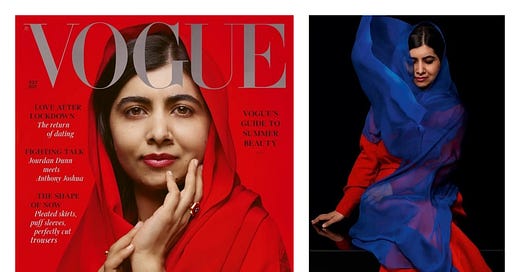


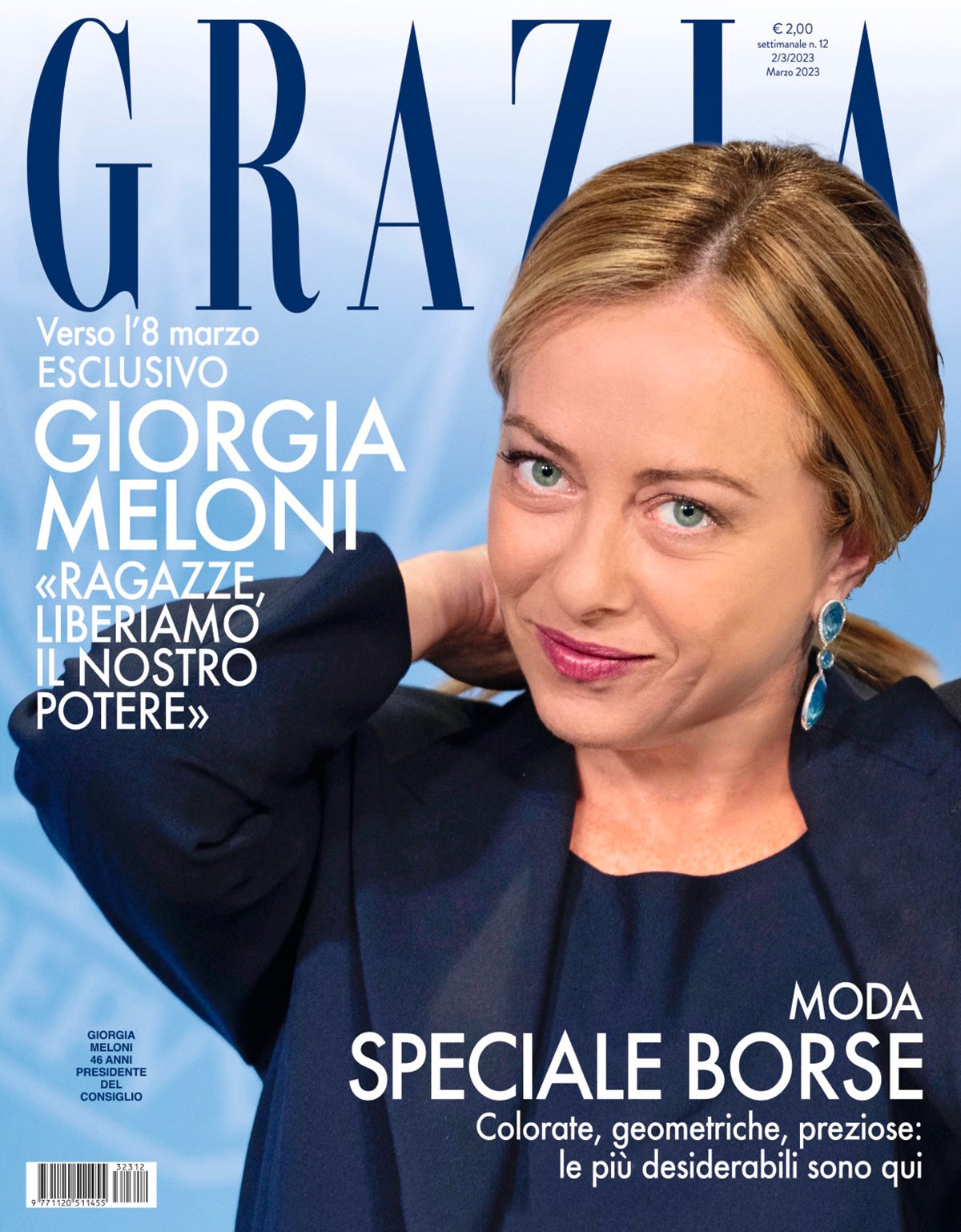
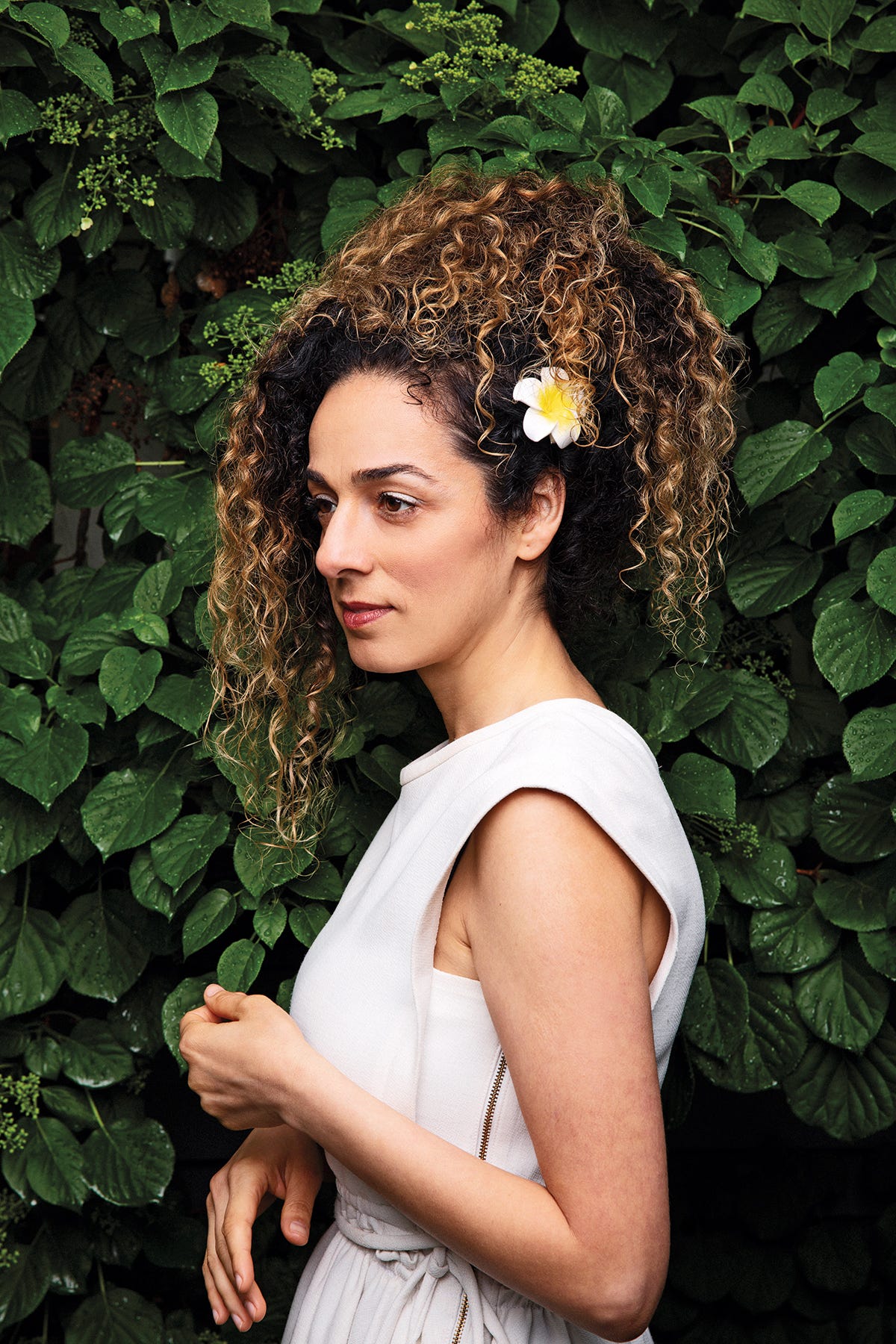
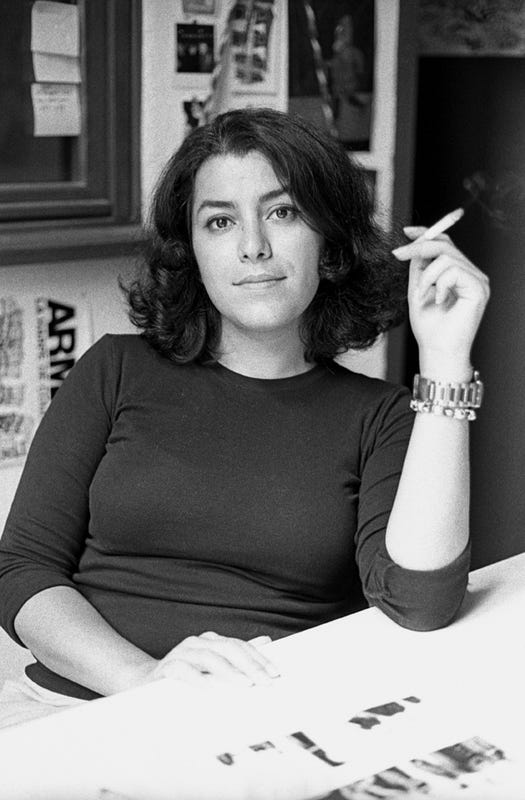
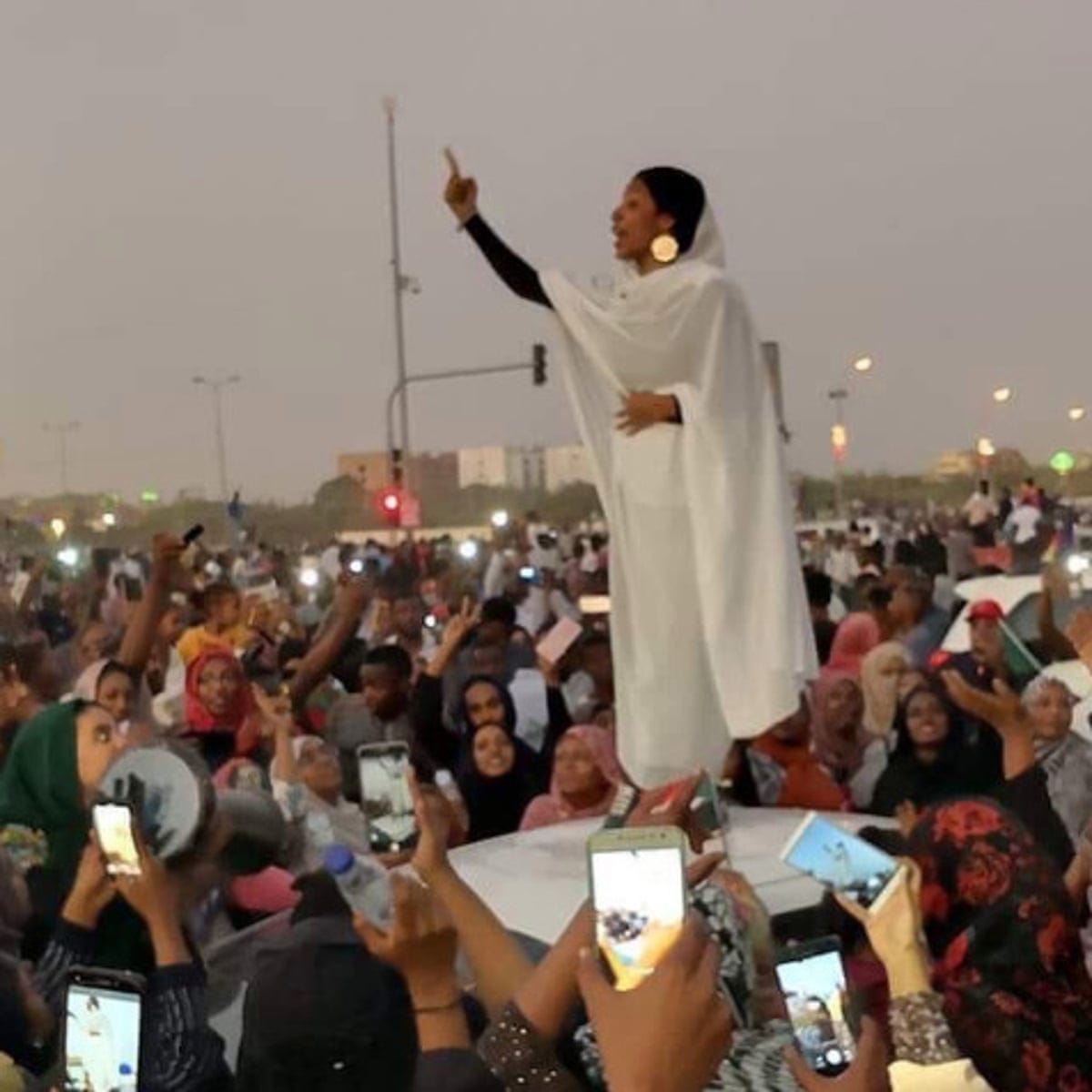


Emmanuelle, can I quote every line of this brilliant piece?! I cannot believe we somehow posted two takes on hijab a day apart! I haven't heard of Aya Mohamed but you better believe I'll be looking her up and checking out her instagram.
I replied to someone on my post that I had never perceived my hijab as political until I was in uni, perhaps in my early 20's and saw that it was perceived as such. I don't mind, per se, and I absolutely see the power of Aya and Malala and others. In fact, I don't mind being political myself when needed.
I suppose my insisting that my hijab is a personal choice IS political, since so many people refuse to see it as such. As many have said, for marginalized communities, joy is political, love is political, existing is political. We do not have the luxury of being apolitical.
I have always loved an interview with Shona Rhimes (the Black woman who created of Grey's Anatomy, Scandal and many other hit shows that were some of the first popular network shows to have such diverse casts in American television. In it, she discusses the concept of being "the first, only, different" and how when there are so few representations of a group, every single representation has such outsized importance, is so symbolic, is meant to speak for the whole group. And then how, over time, as there are more and more examples of the group, those people don't carry such a weight to "represent" - they get to keep some of their individuality and represent themselves. White people have this luxury all the time. They are never representative of anyone but themselves.
I may have to write about this some time. It's stayed with me for years.
Indeed, your article captures the divide even among women about what the hijab symbolizes. I think that this issue of focusing on the hijab and trying to decipher what it might symbolize distracts from other more important things. The important things are freedom, respect for human rights, and empowerment for people--and especially women in the relevant cultures.
If the Iranian regime or the monarchy in Saudi Arabia makes a law tomorrow that makes the wearing of hijab voluntary, does that automatically mean that women in those countries have freedom and equal rights? The hijab is a piece of clothing that has been needlessly politicized. Unending conversations and debates about the symbolism of the hijab are like arguing over the symptoms of a medical illness, instead of treating the underlying disease.
https://purplemessenger.substack.com/